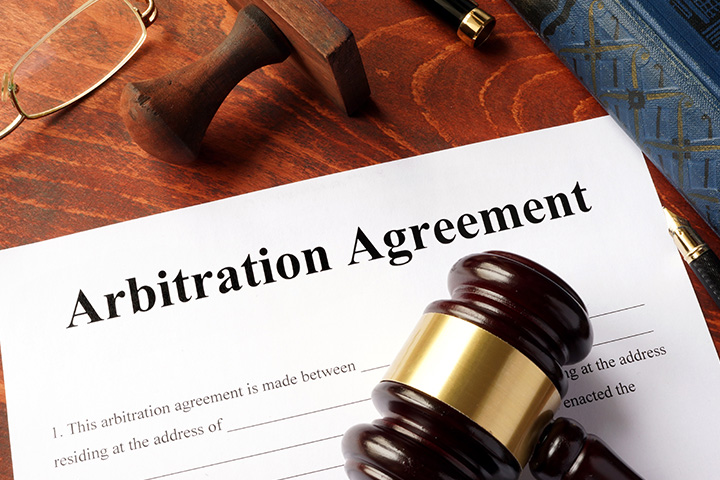
Introduction
Arbitration is a form of alternative dispute resolution. It is another way of resolving your dispute and in some cases will be more cost effective and speedier than issuing traditional litigation proceedings in court. Most types of commercial disputes can be arbitrated, however, the parties must agree to arbitration rather than court proceedings as a way of resolving the dispute.
In the UK, arbitration is governed by the Arbitration Act 1996 and case law.
How is arbitration different from traditional court litigation?
Arbitration is generally considered to be more flexible than traditional court litigation as the parties can choose the arbitrators. Usually, the contract or agreement setting out the business relationship between the parties will contain an arbitration clause, which sets out under what conditions an arbitration can be initiated to resolve a potential dispute.
Below we set out some of the key differences between arbitration and traditional court litigation:
| Arbitration | Traditional |
| Parties can nominate their own arbitrators based on expertise | Parties have no say over the which judge will preside over their case |
| More flexibility in terms of procedure | Procedure tends to be stricter and hearing risks being struck out if deadlines are not adhered to |
| Administered by an arbitral institution | Administered by a court |
| Hearings are confidential | Hearings can be open to the public |
| Resolution may be reached faster | Resolution may take years, especially if the court is facing an administrative backlog |
| After hearing, arbitrator produces an arbitral award | After hearing, judge produces a court judgment |
| Arbitral award is usually final and cannot be appealed | Court judgment can be appealed |
Who administers arbitral proceedings?
Arbitration does not take place at court. Instead, it is administered by arbitral institutions, which may have their own arbitral rules. The arbitral institutions can also help appoint arbitrators where parties are not able to come to an agreement.
Here are some arbitral institutions that administer arbitrations seated in the UK:
Royal Institute of Chartered Surveyors (RICS)
The RICS is a professional body specialising in matters concerning land, property and construction. As part of their dispute resolution services, they offer arbitration proceedings and can appoint a suitable arbitrator with expertise in the field relating to your dispute. RICS-certified arbitrators must pass a series of assessments to ensure a high professional standard is maintained.
London Court of International Arbitration (LCIA)
The LCIA specialises in administering commercial arbitration, with the top industry sectors of the LCIA’s caseload being banking and finance, energy and resources, and transport and commodities. The majority of parties in LCIA arbitrations are based overseas but many of these wish to apply English law to their arbitral proceedings. The LCIA has a large database of arbitrators from different nationalities and with different areas of expertise, allowing them to appoint appropriate arbitrators to each arbitration.
International Chamber of Commerce (ICC)
The ICC is based in Paris however it is an international institution and can administer arbitrations seated in the UK. The ICC promotes international trade, responsible business conduct and a global approach to regulation. Like most arbitral institutions, in order to initiate arbitral proceedings at the ICC, the claimant must submit a Request for Arbitration with the Secretariat of the ICC.
Under what circumstances would arbitration be better for my case?
International disputes
If you are thinking of bringing a claim against a foreign company, you may prefer to initiate arbitration proceedings. Arbitration is well-suited to any disputes with an international dimension. This is primarily because a foreign party may object to proceedings in a national court, which could be seen to favour the party who is a national of that country. Arbitration is more ‘international’ as the place of arbitration can be agreed upon by the parties.
Confidentiality
In traditional court litigation, hearings are usually open to the public and judgments are usually published for anyone to access. However, in arbitration the tendency is towards confidentiality. If you are concerned about protecting your business’s reputation and public image, the confidentiality offered by arbitration proceedings may be more attractive for you.
Recent Developments
Commercial Rent (Coronavirus) Act 2022
In March of this year, the UK government introduced this legislation as a way of dealing with disputes over unpaid rent for commercial leases during the COVID-19 pandemic. The primary purpose of the Act is to encourage disputing parties to use arbitration as a way of resolving their disputes in this area. For more information, please see our blog post on this topic.
Arbitration Act 1996
The Law Commission of England and Wales announced in November 2021 that they would be conducting a review of the Arbitration Act 1996. If necessary, recommendations for reform will be made however the Act is generally viewed as not being in need of a major overhaul. Instead, the purpose of the review is to ensure that the UK remains an attraction place of arbitration for disputing parties.
Contact us
At TV Edwards, our Dispute Resolution solicitors are experts in all aspects of ADR including arbitration and are able to provide you with advice on your matter. From helping you decide whether arbitration or court litigation would be better for your case to finding an appropriate arbitrator, we can help you every step of the way. If you would like to find out more about the services we can offer you, please contact the Dispute Resolution team at TV Edwards Solicitors LLP.







